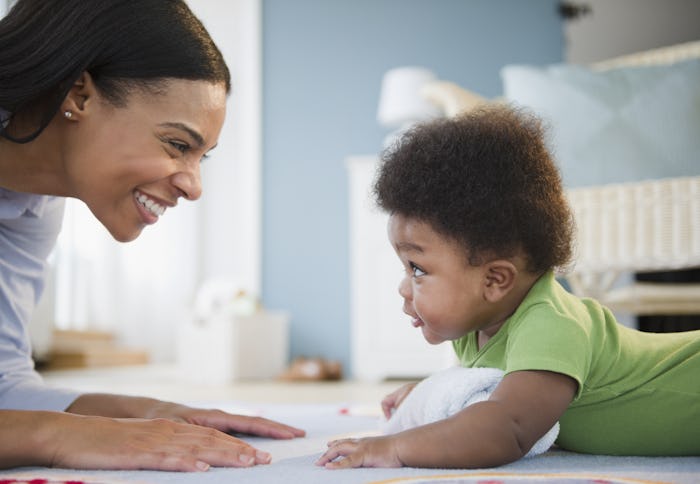Life

WTF Does Your Baby's Babbling Mean?
Listening to your baby babble can be endlessly entertaining. Your little one is practicing all the wonderful sounds a human voice can make, and the result is fascinating (if somewhat loud at times). With this in mind, you may wonder: what is my baby trying to say when they babble? Are all the "da-da-da" sounds an attempt at communication, or just a reflexive way to make noise?
Although your baby's vocalizations may sound pretty random, babbling may have some meaning — at least to your baby. As noted by ABC News, researchers have found that when babies repeat a consonant and vowel sound, such as "ba-ba-ba," they are attempting to master the sounds that make up language. Perhaps all of those seemingly nonsensical sounds actually make perfect sense to your baby.
In fact, babbling may also reveal the beginnings of conversational conventions. According to Kids Health, listening closely to your baby's babble may reveal the rising tones of questions or other fundamentals of language. Remember that talking twin babies YouTube video? Those kids are holding a conversation, complete with hand gestures, in their own babble language. It looks like babies may understand the basics of communication long before they master that whole talking thing.
That said, there are things you can do to help your baby move from babbling to speaking words. As explained on What To Expect, one of the easiest ways to foster language development is to talk back to your baby's babbling as though you're holding a conversation. For instance, if your baby starts chanting "muh-muh-muh" you might repeat the sounds and encourage your baby to respond. This nonsensical conversation may feel silly, but you're encouraging your little one to keep vocalizing and improving his language skills.
What's more, you will probably learn to read at least some of your baby's babble. For instance, your little one may start chanting "bah-bah-bah" when you're preparing his bottle. You could then respond by explaining that yes, it is indeed time for a snack from his bottle. Again, these monologues may feel weird or repetitive, but you're helping your baby prepare for his first spoken words.